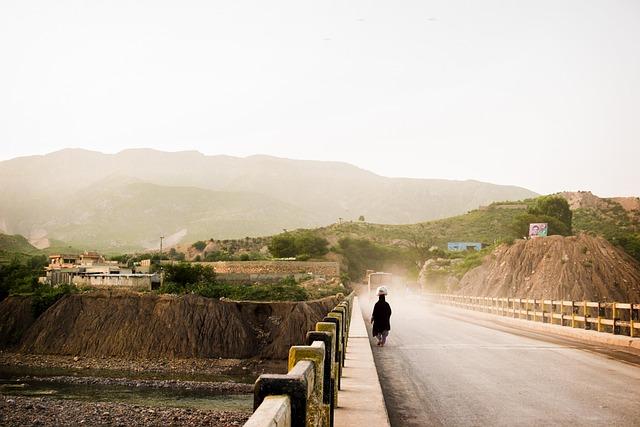In the heart of South Asia lies Pakistan, a nation adorned with a rich tapestry of culture and history yet shadowed by the relentless specter of terrorism. For decades, the country has navigated the precarious path between resilience and vulnerability, striving to carve out a peaceful future amidst challenges that seem insurmountable. As the dynamics of regional and global politics shift, the implications for Pakistan’s internal security remain profound. This article delves into the complex narrative of Pakistan’s ongoing struggle against the shadows of terrorism, exploring the root causes, current strategies, and the enduring spirit of a population determined to reclaim its narrative from the grip of fear. Through a balanced lens, we will examine the multifaceted landscape of militancy, the impacts on society, and the concerted efforts undertaken by the government and communities alike to foster a safer, more stable Pakistan.
The Historical Roots of Terrorism in Pakistan
The roots of extremist ideologies in Pakistan can be traced back to a complex interplay of historical, political, and socio-economic factors. Following its independence in 1947, Pakistan experienced a tumultuous journey marked by the conflict over Kashmir, internal political strife, and a struggle to define its national identity. The Afghan-Soviet War in the 1980s played a pivotal role in shaping the evolution of militant groups and their ideologies within the region. This conflict attracted a surge of foreign fighters and funding, establishing a precedent for the intertwining of religion and nationalism that would later fuel extremist movements.
In addition to external influences, domestic conditions such as economic disparity, lack of education, and pervasive corruption have sown the seeds for discontent. The rising influence of religious parties in politics gradually shifted the discourse towards a more extremist interpretation of Islam, further complicating the landscape. The aftermath of 9/11 precipitated intense military operations against terrorist groups, yet cycles of violence continued, fueled by a deeply entrenched culture of militancy that remains resilient. Dissecting these historical roots is crucial for understanding the contemporary challenges faced by Pakistan in combatting terrorism and restoring peace.

Examining the Impact of Socioeconomic Factors on Extremism
The intricate web of extremism in Pakistan is deeply intertwined with various socioeconomic factors that shape the lives of individuals and communities. Economic disenfranchisement plays a pivotal role, as poverty and lack of educational opportunities can leave individuals susceptible to radical ideologies. When basic needs are unmet, such as access to food, health care, and education, the allure of extremist narratives often becomes a means of coping or belonging. Additionally, factors such as unemployment, income inequality, and social exclusion contribute to an environment where extremism can take root.
Furthermore, the disparity in access to resources creates fertile ground for recruitment by extremist groups, often preying on vulnerable populations. Many young individuals in underprivileged areas may find themselves drawn to these organizations, seeking identity, purpose, and financial support that seems elusive elsewhere. Addressing these socioeconomic inequities is essential in countering extremism. Effective intervention strategies should focus on:
- Providing quality education and vocational training.
- Promoting economic development in marginalized regions.
- Fostering community engagement to build resilience.

Strengthening Civil Society: A Collective Responsibility
The necessity of fostering a robust civil society has never been more critical in the face of Pakistan’s ongoing struggle against terrorism. Engaging citizens from all walks of life in the effort to combat extremist ideologies is vital for building resilience and solidarity. Communities need to come together to create a unified front, sharing resources and knowledge to empower each individual in the fight against fear and division. Grassroots initiatives, local non-governmental organizations (NGOs), and community movements play an essential role in weaving a fabric of resilience against the scourge of violence. Collaboration among different sectors can lead to innovative solutions, helping to promote peace and ensure that every voice is heard in shaping the future.
Moreover, enhancing education and awareness is a cornerstone of cultivating a strong civil society. By championing truth, diversity, and tolerance, communities can counteract the narratives propagated by extremist factions. Workshops, seminars, and public dialogues can facilitate discussions on the importance of coexistence and empower individuals to challenge radical rhetoric. Investing in youth programs and offering platforms for artistic expression can also deter vulnerable populations from falling prey to extremist ideologies. Importantly, a comprehensive approach that includes policy advocacy, community engagement, and public education initiatives will fortify efforts to curb terrorism and promote a culture of peace and understanding.
| Strategies for Strengthening Civil Society | Impact on Terrorism |
|---|---|
| Community Engagement | Building trust and solidarity among citizens |
| Education and Awareness Campaigns | Countering extremist narratives |
| Support for Local NGOs | Fostering grassroots initiatives for change |
| Youth Empowerment Programs | Reducing vulnerability to radicalization |

Navigating International Partnerships for Counterterrorism Efforts
In the realm of counterterrorism, collaboration across borders is essential for addressing the complex nature of threats. Countries are recognizing that they cannot combat terrorism in isolation; instead, they require a robust network of alliances to share intelligence, resources, and strategies. Joint training programs, intelligence-sharing agreements, and cooperative law enforcement initiatives have emerged as key components in these international partnerships. By uniting efforts, governments can enhance their operational capabilities while also improving their understanding of the nuanced socio-political factors that contribute to extremism.
The efficacy of these partnerships is often reflected in their ability to adapt to the evolving landscape of terrorism. Successful collaborations often include action plans that contain:
- Joint task forces to tackle specific threats identified through shared intelligence.
- Capacity-building assistance that empowers partner nations to strengthen their own counterterrorism frameworks.
- Public awareness campaigns aimed at countering radicalization and promoting community resilience.
Collaboration also extends to international organizations, where joint efforts can be coordinated for maximum impact, allowing countries like Pakistan to leverage support from a global community committed to peace and security.
Concluding Remarks
As we traverse through the complex landscape of Pakistan’s ongoing battle against terrorism, it becomes clear that this struggle is not merely a fight against a faceless enemy but a quest for peace, stability, and self-identity. The shadows of terrorism may loom large, but they also serve as a catalyst for resilience and unity among the nation’s diverse populace.
Much like a tapestry woven with threads of hope, courage, and determination, the citizens of Pakistan continue to seek light in the darkness, striving to rewrite their narrative amid adversity. With each step toward recovery and reform, they demonstrate an unwavering commitment to fostering a safer and more prosperous future.
The road ahead remains fraught with challenges; however, it also holds the promise of transformation. As Pakistan navigates this intricate journey, the world watches, bearing witness to a story marked by tenacity and the relentless pursuit of harmony. the nation’s enduring spirit might just illuminate a path not only for itself but for others wrestling with the specter of terror. The next chapter is still unwritten, and Pakistan’s resilient heart beats steadily, ready to face whatever lies ahead.



